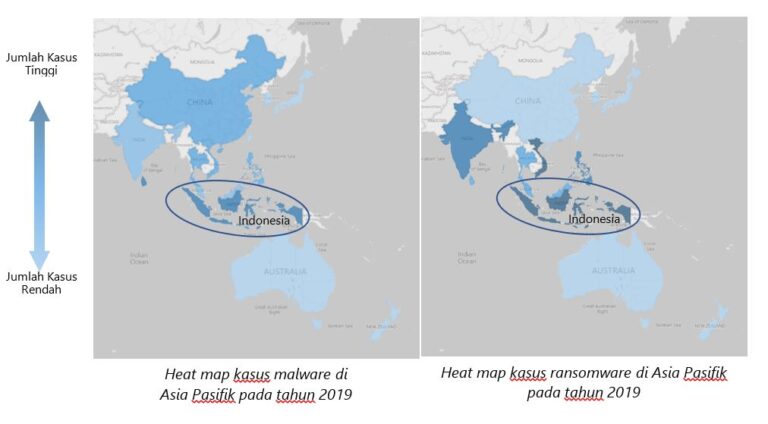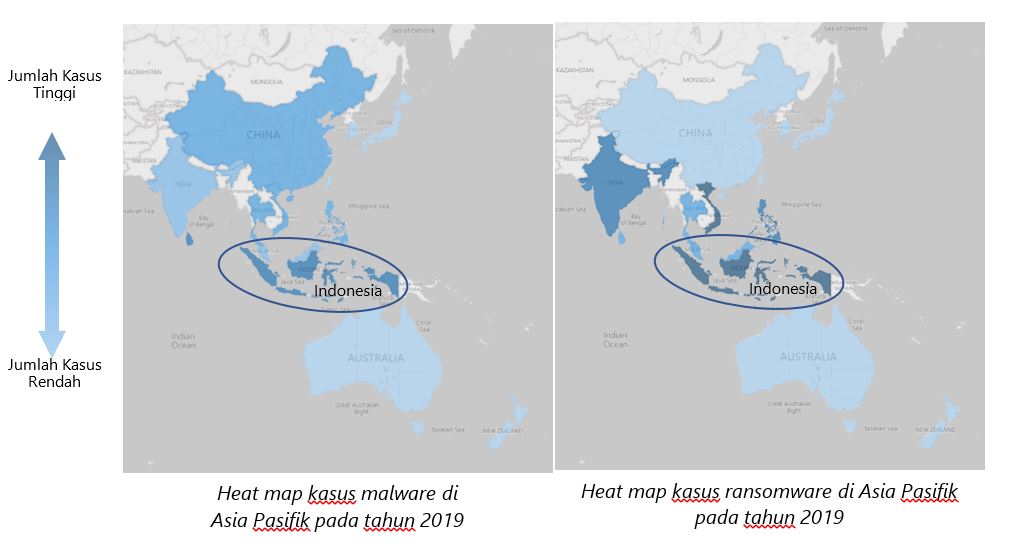- Indonesia also recorded some of the highest cryptocurrency mining and malware encounters in the past year
- Microsoft Threat Protection Intelligence team warns that cybercriminals are taking advantage of COVID-19 concerns, adapting, and updating attack methods
Microsoft unveiled Asia Pacific findings from the latest edition of its Security Endpoint Threat Report 2019[1], which revealed that Indonesia had the highest malware encounter rate across the region. The country also experienced high cryptocurrency mining and ransomware encounters in the past year.
Findings were derived from an analysis of diverse Microsoft data sources, including 8 trillion threat signals received and analyzed by Microsoft every day, covering a 12-month period, from January to December 2019.
“As security defenses evolve and attackers rely on new techniques, Microsoft’s unique access to billions of threat signals every day enables us to gather data and insights to inform our response to cyberattacks,” said Mary Jo Schrade, Assistant General Counsel, Microsoft Digital Crimes Unit, Microsoft Asia.
“The Microsoft Security Endpoint Threat report aims to create a better understanding of the evolving threat landscape and help organizations improve their cybersecurity posture by mitigating the effects of increasingly sophisticated attacks.”
Malware and ransomware encounters remain high in Indonesia
According to the report, Asia Pacific continues to experience a higher-than-average encounter rate for malware and ransomware attacks – 1.6 and 1.7 times higher than the rest of the world, respectively.
Indonesia registered the highest malware encounter rate across the region, at 10.68 percent in 2019. Despite a 39 percent decrease in the past year, this was still 2 times higher than the regional average.
The country also registered the 2nd highest ransomware encounter rate across the region, at 0.14 percent, despite a 46 percent decrease in the past year. This was 2.8 times higher than the regional average.
“Often, high malware encounters correlate with both piracy rates and overall cyber hygiene, that includes regular patching and updating of software. Countries that have higher piracy rates and lower cyber hygiene tend to be more severely impacted by cyberthreats. Patching, using legitimate software, and keeping it updated can decrease the likelihood of malware and ransomware infections,” said Haris Izmee, President Director of Microsoft Indonesia.
Cryptocurrency mining encounter rate was 2 times higher than regional average
According to the report, Indonesia’s cryptocurrency mining encounter rate stood at 0.10 percent in 2019. Despite the 72 percent decrease from 2018, this was 2 times higher than the regional and global average, and the 4th highest encounter rate across the region.
During such attacks, victims’ computers are infected with cryptocurrency mining malware, allowing criminals to leverage the computing power of their computers without their knowledge.
“While recent fluctuations in cryptocurrency value and the increased time required to generate cryptocurrency have resulted in attackers refocusing their efforts, they continue to exploit markets with low cyber awareness and low adoption of cyber hygiene practices,” explained Haris.
Drive-by attack volume in Indonesia was 1.5 times of global and regional average
The drive-by download attack volume[2] in Asia Pacific has converged with the rest of the world at 0.08, declining by 27 percent from 2018.
Indonesia’s drive-by download attack volume stood at 0.12 in 2019, according to the report. Despite the significant 61 percent decrease, this remained 1.5 times higher than the regional and global average, and Indonesia recorded the 6th highest attack volume across the region.
These attacks involve downloading malicious code onto an unsuspecting user’s computer when they visit a website or fill up a form. The malicious code that is downloaded is then used by an attacker to steal passwords or financial information.
Despite the general decline in drive-by download attacks across the region, the study found that regional business hubs, Singapore and Hong Kong, recorded the highest attack volume in 2019, over three times the regional and global average.
“We usually see cybercriminals launch such attacks to steal financial information or intellectual property. This is a likely reason why regional financial hubs recorded the highest volume of such threats. The high attack volume in these markets may not necessarily translate into a high infection rate, perhaps due to their good cyber hygiene practices and use of genuine software,” said Haris.
Cybersecurity in the age of COVID-19
With the turn of the new year, COVID-19 has changed the landscape and remains the top-of-mind concern for individuals, organizations, and governments around the world.
Since the outbreak, Microsoft Intelligence Protection team’s data has shown that every country in the world has seen at least one COVID-19 themed attack, and the volume of successful attacks in outbreak-hit countries seems to be increasing, as fear and the desire for information grows.
Of the millions of targeted phishing messages seen globally each day, roughly 60,000 include COVID-19 related malicious attachments or malicious URLs. Attackers are impersonating established entities like the World Health Organization (WHO), Centers for Disease Control and Prevention (CDC), and the Department of Health to get into inboxes.
Haris further explained, “According to our data, we found that COVID-19 themed threats are mostly rethreads of existing attacks that have been slightly altered to tie to the pandemic. This means that attackers have been pivoting their existing infrastructure, like ransomware, phishing, and other malware delivery tools, to include COVID-19 keywords, to capitalize on people’s fear. Once users click on these malicious links, attackers can infiltrate networks, steal information and monetize their attacks.”
Businesses and individuals have a crucial role to play in navigating cyberspace securely and are encouraged to take the following steps:
Guidance for businesses:
- Have strong tools to safeguard employees and infrastructure. This means looking into multi-layered defense systems and turning on multi-factor authentication (MFA) as employees work from home. Additionally, enable endpoint protection and protect against shadow IT and unsanctioned app usage with solutions like Microsoft Cloud App Security
- Ensure employee guidelines are communicated clearly to employees. This includes information on how to identify phishing attempts, distinguishing between official communications and suspicious messages that violate company policy, and where these can be reported internally
- Choose a trusted application for audio/video calling and file sharing that ensures end-to-end encryption
Guidance for individuals:
- Update all devices with the latest security updates and use an antivirus or anti-malware service. For Windows 10 devices, Microsoft Defender Antivirus is a free built-in service enabled through settings
- Be alert to links and attachments, especially from unknown senders
- Use multi-factor authentication (MFA) on all accounts. Now, most online services provide a way to use your mobile device or other methods to protect your accounts in this way
- Get educated on how to recognize phishing attempts and report suspected encounters, including watching out for spelling and bad grammar, and suspicious links and attachments from people you do not know
For more information on the findings published on the Microsoft Security Intelligence website, please visit: https://www.microsoft.com/securityinsights
[1] Research covered a total of 15 markets, which include China, India, Indonesia, Malaysia, Philippines, Sri Lanka, Thailand and Vietnam, Taiwan, Singapore, New Zealand, Korea, Japan, Hong Kong, and Australia.
[2] The Security Endpoint Threat Report records the average volume of drive-by download pages detected for every 1,000 pages indexed by Bing.


